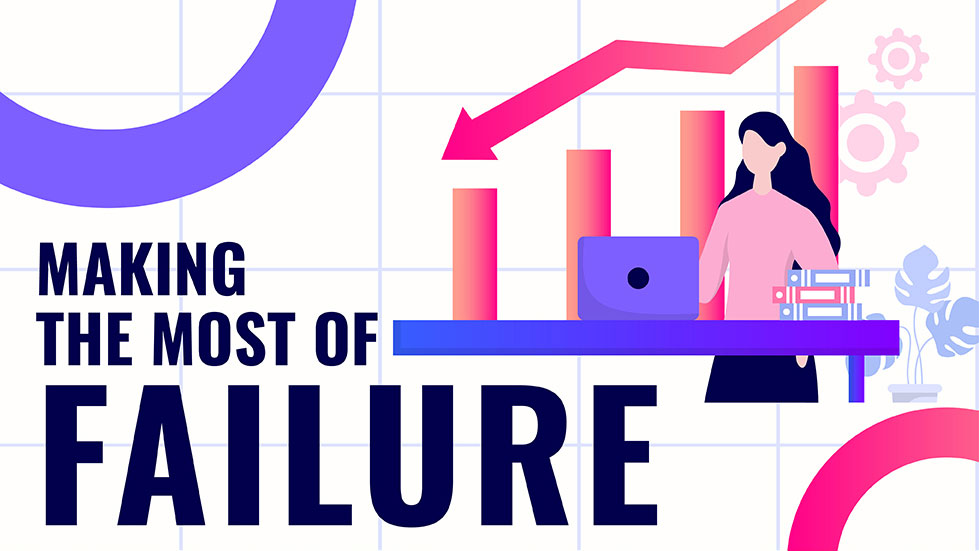
We live in a success-obsessed society. No one wants to be perceived as a “loser” or to let themselves or anyone else down. In fact, failure is not only something to avoid at all costs but something to fear. However, failures are also underappreciated. Since no individual or group is “perfect,” failure is inevitable. So, why not optimize it? You can fail forward. When you fall short of those monthly or quarterly goals, do not let the failure define or demoralize you as a manager, owner, clinician, practice, or team. When you are disappointed by a response to an organized event or campaign, do not stagnate and become mired in failure. True to this wisdom, use it to move forward.
The science
In a massive study of organizational failures and successes spanning more than 45 years of data, researchers found that those who succeeded following a setback were also those who learned the most and, beyond that, these “winners” incorporated the most components of their failed attempts into their later efforts —the ones that were eventually successful. In fact, it was noted that the very worst performers were those who learned the least and, moreover, incorporated ZERO components from their failed attempts into their later tries. It was like the failure never existed. They wiped it clean and did not learn from it. Instead, they wasted valuable time and energy on completely new concepts. Conversely, those top performers/learners were successful relatively soon after they failed. Even those groups characterized as middling produced new iterations based on retaining at least some of what was learned from their failure at a faster and faster rate until they, too, were successful—be it in landing a government grant or securing funding from a venture capitalist.
Researchers also reported that the most successful groups learned from their previous mistakes by doing two things:
- Soliciting and incorporating feedback from others, especially those outside of their respective organizations
- Gleaning lessons from their past mistakes and acting upon the specific things that were learned—there is simply no book or other source of information that is quite as enlightening or beneficial as the learned experience
In short, it is not sufficient to simply persevere. This can be a fool’s errand if we are constantly reinventing the wheel. We are not learning anything along the way. We must try and try again, but how we try matters and can make all of the difference.
Understanding failures
When developing action steps to bounce back from failures, it is also important to understand that not all failures are the same. With an understanding of the type of failure, you can better make the right next steps or moves to ensure they do not keep repeating themselves. You can also better position your organization to fail in certain ways and to avoid specific types of failures when possible. Author Amy Edmondson (The Right Kind of Wrong: The Science of Failing Well) classifies failures into three categories:
- Basic
- Complex
- Intelligent
Examples of basic failures typically stem from human error, blind spots, and lapses—those mistakes that are both easy to prevent and easy to overlook. While they may be relatively minor, they can build upon themselves and eventually be a costly reputational risk, especially for healthcare practices. It is important to identify patterns and address them promptly. When this approach is built into the fabric of your workplace, you can catch these potential mishaps before there are enough of them even to produce patterns, and you can support overall more efficient and resilient operations.
True to their name, complex failures are a collision of issues and a confluence of often unforeseen factors and unexpected challenges. An example that practices of all disciplines may relate to is the COVID-19 response. Those organizations that largely had at least some disaster preparedness response in place may have at least transitioned into the new normal with greater fluidity and ease than those who had not planned for the unexpected. It really pays to consider all variables with your team and then discuss ways to address each one. This provides some structure for conversations around how different factors and parts of your practice interact with and influence each other.
When it comes to failing well, Edmonson asserts that intelligent failures are the way to go. Fitting its name, these failures are well-informed. Unlike the other two possibilities mentioned here, intelligent failures are described as “small-scale experiments.” They use minimal resources (working smarter, not harder) to glean invaluable insights. You can test new ideas as long as the outcomes along the way are used to guide the next strategic steps and are used to develop future strategies. You are truly using your office’s “intelligence” to succeed, and there is a lot of data and information to be used that perfectly blends and balances innovation with the time-tested and experiential.
More action steps to turn failures into positives
Never underestimate the power of failure to lift, motivate, and add fresh vigour and perspective to your practice. We encourage you to:
- Take the time out of the busy day-to-day rush to honestly reflect on any disappointing results or outcomes. Always set aside and be intentional about making time for any assessments of campaigns, initiatives, and strategies. Ensure your response and reaction are healthy and productive, and focus on deriving as much information as possible to eventually succeed—accounting for what worked well as much, if not more so, than what may not have worked so well. Avoid the temptation to see each effort as black and white, with either “good” or “bad” outcomes. Very few things in life are that clearly defined, especially when it comes to long-term goal-setting and strategies or milestones to reach those goals.
- Encourage a healthy dialogue among all team members. This should be a foundation of your practice at all times, not just when exploring how to come back from or respond to failures. However, in these situations, it is particularly beneficial when your team may feel discouraged or lack motivation. By inspiring true candour and open communication, not only do you have more minds coming together to brainstorm fresh concepts, but you also minimize the risk of your workplace culture and morale taking a hit following a perceived setback.
- Seek out feedback beyond the walls of your office. As noted in the above research, incorporating feedback into revamped efforts played an integral role in successes following previous failed attempts. Notably, this feedback came from outside of the organizations that studied themselves. There is substantial power in external perspectives. It is helpful to actively solicit feedback from those parties who may have been even tangentially involved with the initiative or effort that fell short. From there, these parties may have ideas to reach your goals that you never considered because you may be too “in the weeds.” These recommendations might include ways to better track and analyze progress, which then supports more nimble and proactive adjustments along the way. You may just find that you are far closer to success than you thought!
As Thomas Edison famously said, “Many of life’s failures are people who did not realize how close they were to success when they gave up.” Edison failed many, many times, but he is hardly considered a “failure.” With all of this in mind, we urge you to stay focused on your goal and purpose in the fallout of a perceived failure and to not only move on from it but to learn from it fearlessly!
About the author

Naren Arulrajah, President and CEO of Ekwa Marketing, has been a leader in medical marketing for over a decade. Ekwa provides comprehensive marketing solutions for busy dentists, with a team of more than 180 full time professionals, providing web design, hosting, content creation, social media, reputation management, SEO, and more. If you’re looking for ways to boost your marketing results, call 855-598-3320 for a free strategy session with Naren. You may also schedule a session at your convenience with the Senior Director of Marketing – Lila, by clicking https://www.ekwa.com/msm/.











